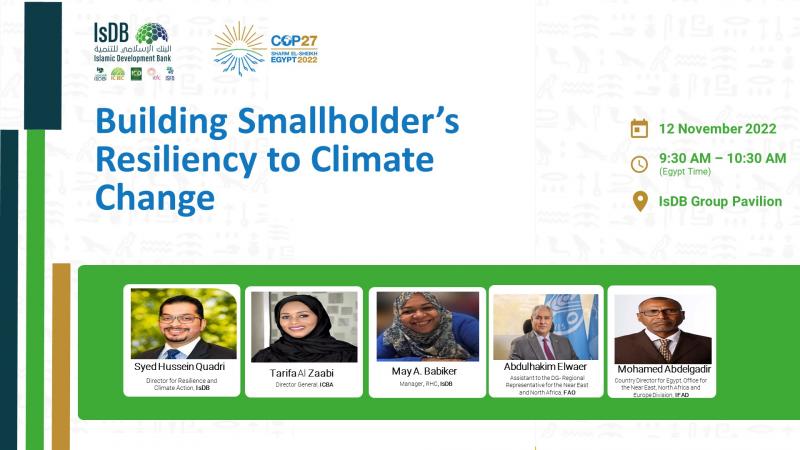
Building Smallholder Resiliency to Climate Change
Time & Date of Event
9:30 AM to 10:30 AM on Saturday, 12th of November 2022
Event Overview
Agriculture is a major driver of IsDB Member Country (MC) economic development and a keystone of food security and poverty alleviation. Smallholder farmers dominate agriculture across MCs, particularly in Africa, with an estimated 33 million smallholder farmers contributing up to 70 percent of the food supply in Africa as a whole.
Smallholder farming systems face multiple challenges, including access to finance, agricultural inputs, technology, and markets. In addition, Africa's smallholders represent the largest climate-vulnerable population on the planet. Their livelihood relies entirely on the environment, extremely vulnerable to even minor changes in temperature or rain patterns. As a result, climate change threatens to have devastating humanitarian and economic consequences.
Therefore, it’s important to strengthen smallholder farming system adaptation and coping mechanisms to growing climate shocks and risks. Considering this, attempts should be geared towards addressing the challenges and promoting climate-smart agriculture that ensures the productivity and sustainability of these farming systems in a holistic manner.
Objectives of the event
- Highlight the importance of building the resilience of smallholder farming in addressing poverty and food insecurity challenges (SDGs 1 & 2).
- Deepening the understanding of challenges facing smallholder farmers to be climate resilient.
- Exchange best practices on building resilient smallholder farming and food systems.
- Highlight the development community’s current and future efforts (focusing on IsDB) in supporting smallholder farmers in their climate adaptation journey.
Event Outcomes
- Deepen understanding of best practices for building climate-resilient smallholder farming systems across MCs, particularly Africa.
- Enhanced awareness of IsDB's new strategic direction, including the Food Security Response Program (FSRP).
- Deepen partnerships and identify potential areas for cooperation between IsDB and other participating international institutions (FAO, IFAD, and ICARDA).